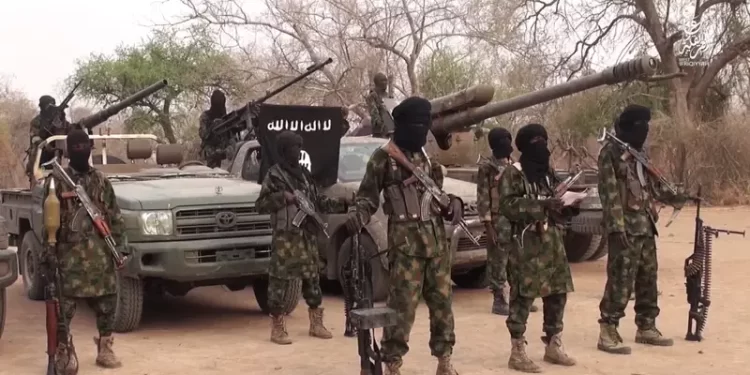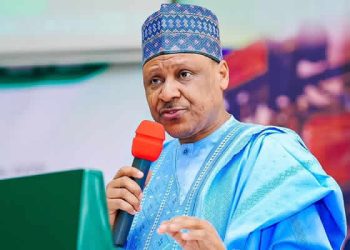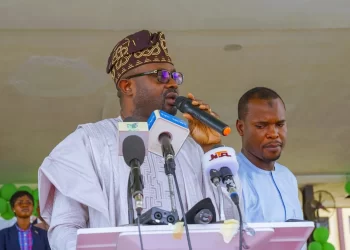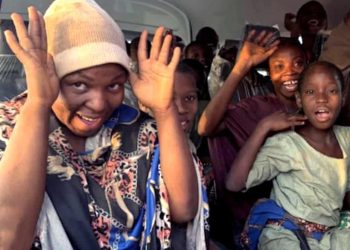Former Troop Commander in the Nigerian Army and Director of Information Communication Technology at the Headquarters of the Nigerian Army Signals, Gen. Peter Aro (retd.), speaks on the resurgence of Boko Haram terrorism and banditry in some parts of Northern Nigeria, among others
Excerpts:
There’s been a resurgence of Boko Haram attacks and bandit raids by non-state actors lately. What do you think is driving this?
The resurgence of Boko Haram and banditry stems from opportunity and weak institutions. These groups thrive in chaos, exploiting porous borders, collapsed livelihoods, and overstretched security forces. When governance fails and people lose the means to survive, violence becomes a substitute for order.
The weakening of multinational joint task force coordination has only widened the vacuum, giving militants the breathing space to regroup and rearm. According to Commodore Kunle Olawumi (retd.), the government, through DSS, has a list of sponsors. Let it expose them.
If the government indeed possesses the list of Boko Haram sponsors, why do you think it has chosen not to release the names or prosecute the suspects?
Sometimes, governance operates in that murky space between what is known and what can be safely said. Releasing such a list now, when the nation already sits atop layers of tension, could ignite fires that even the truth may not be able to quench.
It’s not always about fear; it’s often about timing, control, and the fragile balance of power. When a country is this brittle, even justice must learn patience, lest it becomes another weapon of chaos.
Those who now shout the loudest, forget that when the matter concerned their own region, they kept sealed lips. It was during General (Muhammadu) Buhari’s time that these issues surfaced, yet no names were mentioned.
Why now, when the political tide has shifted? It’s like someone with an untreated wound pretending all is well, only to cry foul when another stubs a toe. If a man feels no pain for his own sore, what exactly is your pain in his healing?
Former Chief of Defence Staff, General Lucky Irabor (retd.), said in his new book that only an emergency proclamation backed by the National Assembly could effectively tackle the Boko Haram insurgency. How realistic is that?
It is realistic, and it can be useful, but only if it is honest and well-resourced. An emergency proclamation can focus political will, funding, and legal authority, yet it will fail if it is a cosmetic move without sustained logistics, clear objectives, accountability, and civilian protection. The declaration should be phased but total in intent.
In one North-East state, I heard that almost all local government chairmen live permanently in hotels in the state capital; they receive their allocations there and share the proceeds without ever visiting their local government headquarters.
Must it continue like that? Once other governors see that the Federal Government can actually bite, you will be surprised at the positive chain reactions across the country.
President Bola Tinubu, six months ago, declared a state of emergency in Rivers State, but it has been subjected to heated debates and controversy. Do you think he can still do that for the troubled northern states to allow the military full control?
Yes, the 1999 Constitution (Section 305) gives the President the power to declare a state of emergency when there’s a breakdown of public order, though that power comes with time limits and parliamentary oversight. But sometimes, in a democracy, we must take bold steps to find lasting solutions.
Even President Trump deployed the National Guard to Los Angeles (California) and currently to Chicago (Illinois) without the full support of their governors, because leadership sometimes means acting when others hesitate.
The President should consider the same approach to improve security, especially in areas where lives are being wasted daily. After all, he exercised that same authority in Rivers State when the situation demanded it. The law allows firmness, and firmness is what the moment requires.
Irabor claimed the terrorists use religion to justify mass killings. In your view, does Boko Haram have any genuine link to faith?
He is right. Boko Haram only uses religion as a cover. Their violence is not about faith: it’s about power, control, and money. They borrow the language of religion to deceive followers and scare people, but the real fire behind their actions is anger, and they are being sponsored to cause mayhem for cheap political gains. Religion is just the mask they wear to hide their true intentions.
From your perspective, what is the single biggest factor fuelling the Boko Haram insurgency?
The biggest factor fuelling Boko Haram is broken governance: weak state presence and deep impunity. In many local areas, the government practically doesn’t exist. Local government chairmen stay permanently in Maiduguri for security reasons, collecting allocations in the state capital without ever returning to their headquarters. As a result, communities are abandoned, and the people feel forgotten.
The governor, for political reasons, cannot compel them to go back because doing so may make him unpopular, and no politician wants to lose support. When the state fails to provide security, justice, or opportunity, violent groups step in to fill that vacuum. They become the only authority people see, and that is how insurgency takes root.
The Kwara State Government recently urged the Federal Government to establish a military barracks in its troubled areas. Do you see this as a lasting solution to the banditry in the state?
A barracks helps tactically; it allows quicker response, better reinforcement, and acts as a strong deterrent to criminals. It also boosts intelligence gathering because security personnel are closer to the people and can respond faster to distress signals.
Beyond the physical presence, it builds psychological confidence; when people feel protected, they are more willing to share information freely. But a barracks alone is not a silver bullet. Lasting peace requires more: community policing, trust between citizens and security agencies, steady logistics, and visible justice for offenders. When the people see that the government is truly present and responsive, fear gives way to cooperation, and security naturally strengthens.
Reports say several Borno State border towns have fallen to terrorists, forcing thousands to flee to Cameroon. What’s your advice to the state and federal governments on reclaiming those territories?
The solution must be three-pronged: first, regain and hold territory through coordinated military operations, supported by strong air power and logistics, so that civilians can safely return home. Second, restore basic services quickly: schools, clinics, and roads to give people a sense of normal life again. Third, strengthen regional cooperation and border management to block the movement and supply of insurgents.
After every military success, troops should stay put rather than withdraw, and the Civil Defence Corps should be strategically deployed to secure liberated communities. Deployment must be intelligent, not just numerical.
Although relations with Niger Republic are strained, Nigeria must now apply diplomatic wisdom; the National Intelligence Agency and the Ministry of Foreign Affairs can serve as powerful tools to rebuild cross-border collaboration. Beyond boots on the ground, modern technology must support the effort.
Early warning systems such as stratospheric balloon platforms equipped with high-resolution cameras and synthetic aperture radar can provide real-time surveillance, detect movement in remote areas, and alert forces before attacks happen. Military action is crucial, but it must be paired with smart diplomacy, modern intelligence, and visible governance to make victory sustainable.
Given how the insurgency has evolved, do you believe it carries any political undertone?
Yes, insurgency is a political mask. Insurgency becomes political when local powerbrokers treat violence as a tool. Some politicians quietly sponsor armed groups to weaken rivals, trash a government’s credibility, or make areas ungovernable so they can rule by patronage and fear. Where politicians benefit from chaos—by capturing votes, controlling contracts, or harvesting ransom pay-outs—there is an incentive to keep the state weak rather than fix it.
Grievance is a useful cover. Politicians dress their actions in the language of revenge or protection, saying, ‘We are fighting for our people’, and this turns local anger into fuel for violence. They then present themselves as the only alternative, asking communities to trade liberty for security that keeps the patronage flowing. Studies of banditry and insurgent evolution show how patronage and corruption warp local incentives.
The payoff is both political and financial. Making a place ungovernable lowers oversight and opens space for illicit economies: smuggling, ransom, land grabs, and control of local markets. Those who profit from the chaos can amass wealth and build networks that shield them from accountability, deepening impunity and ensuring the violence outlives short-term political cycles.
How do you think terrorists get access to such sophisticated weapons?
Weapons reach terrorists through several overlapping routes: porous borders and corrupt checkpoints let arms leak in from illicit markets and neighbouring conflicts; fighters also capture weapons on the battlefield or buy them from middlemen in criminal networks.
Dark brokers, foreign fighters, and online black-market channels are other possible markets for such, while corrupt officials or security personnel sometimes divert state arms or look the other way.
Some US senators have alleged an ongoing genocide against Christians in Nigeria, but the Federal Government insists the terrorists target all faiths. Where do you stand on this debate?
There is no genocide in the formal sense of the word. What we see is brutal, widespread violence and displacement that cuts across religion and ethnicity. However, because many of the victims in states like Plateau and Benue are Christians, the situation is often perceived as genocide, especially when the government’s response appears slow or indifferent.
Perception hardens when people recall how swiftly the authorities acted in other cases, like the killing of Fulani hunters in Edo State. That contrast fuels suspicion of bias and neglect.
The violence in Nigeria is complex, rooted in land conflicts, revenge cycles, banditry, and weak governance, not a coordinated campaign to wipe out one faith. – Culled from Punch.














































